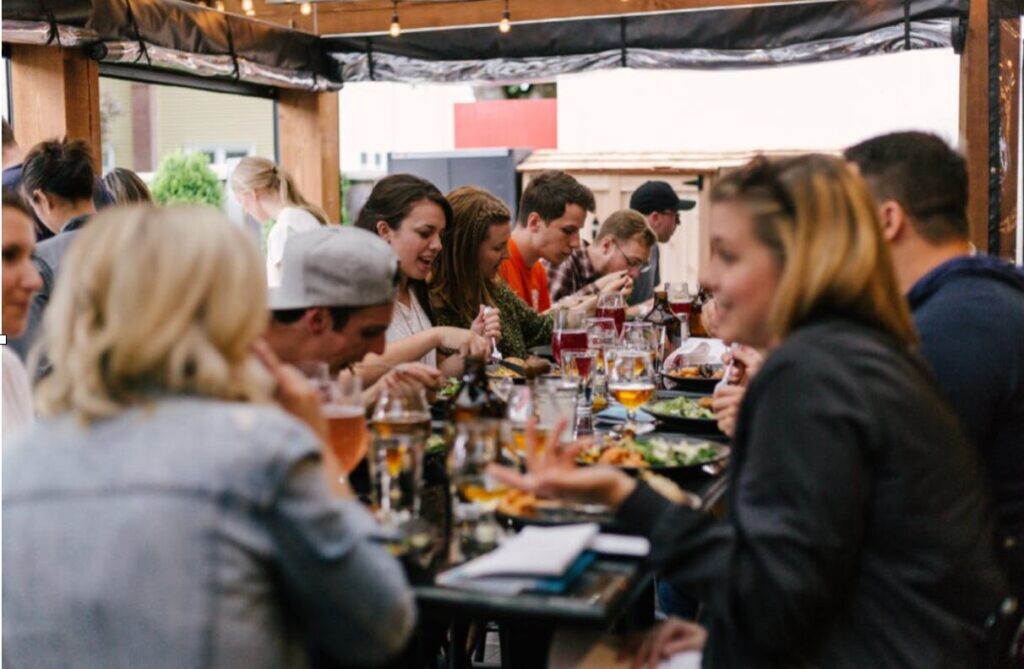
When a French friend of mine first moved to London, she found one local tradition utterly mystifying.
It wasn’t the English penchant for talking about the weather, or for apologising when someone else steps on your toes.
It was that Londoners eat while walking down the street.
“Devouring a Niçoise salad and dodging pedestrians at the same time is not a sign of civilisation,” my friend told me, with Parisian hauteur. “It’s a sign that you need to slow down.”
She has a point. In the modern world, the art of eating has been sacrificed on the altar of speed and efficiency.
Everywhere, industrial farms pump out cheap, low-calibre food. Cooking by microwave then adds insult to injury.
The act of eating has become a race against the clock. One study found that the average meal in the United States lasts just 11 minutes. Breakfast and lunch can be as short as two minutes.
Eating is often incidental, something we do while doing other stuff—driving, doomscrolling, watching Netflix, walking down the street.
Maybe you’re reading this article while dining al desko.
This roadrunner approach to food takes a toll on everything from our health and mood to our relationships and the environment.
The remedy? Take the advice of my French friend and slow down.
We already know that farming at the slower pace of nature is better for the planet.
By the same token, eating less quickly helps digestion and guards against gluttony by giving the stomach time to tell the brain that it is full. It also allows you to savour what you put in your mouth.
Sharing food brings people together, too. It’s no accident that the word companion derives from the Latin for ‘with bread’.
Oscar Wilde noted that breaking bread together can help us bond even with those we find hardest to stomach: “After a good dinner one can forgive anybody, even one’s own relations.”
Having a regular family meal can even improve children’s behaviour and academic performance.
Alice Waters, the legendary American chef, put it best when she said that “only slow food can teach us the things that really matter—care, beauty, concentration, discernment, sensuality, all the best that humans are capable of, but only if we take the time to think about what we’re eating.”
That is why people everywhere are finding ways to build a slower relationship with food.
Look at the renaissance of the farmers’ market. The artisanal boom in everything from beer and bread to cheese and chocolate. The trend for eating local and organic. The rise of vegetable gardens and cooking classes.
The international Slow Food movement, which stands for everything that fast food does not, has grown briskly.
The pandemic supercharged this trend. During the long months of lockdown, many of us found solace in devoting more time and attention to food.
Making a meal by hand, touching the raw materials, feeling your way through a recipe, tasting, adjusting, engaging all the senses, can be a soothing release—especially in dark times.
Preparing and then lingering over dinner was the highlight of the day in my locked-down home.
If you’re like me, your feed is now rammed with images of friends and family pickling vegetables or nursing sourdough starters.
Though the pandemic shone a light on the chasm between haves and have-nots, eating well need not be a luxury for the rich. As Jean Anthelme Brillat-Savarin, the 19th century French gastronome, put it: “The pleasures of the table are for every man, of every land, of every place in history or society.”
Translation: Slow Food does not have to mean a hand-made banquet worthy of a Michelin star.
You can prepare a simple pasta or soup in less time and for less money than it takes to order in pizza or noodles.
Here are some tips for slowing down with food:
Grow a few herbs, like mint, rosemary or thyme, in the garden or on the windowsill. Buy fresh ingredients.
Turn cooking into a moment of restorative me-time. Or make it a communal affair by getting others to help chop, grate, stir, simmer, taste and season.
Eat together round a tech-free table so you can relish the food and let the conversation flow.
But don’t lose heart if you fall short of the Slow Food ideal. Nobody’s perfect. And I mean nobody:
The last time I saw my French friend, she was dashing down the street chewing on a bagel.
(First published in Radiant Life)